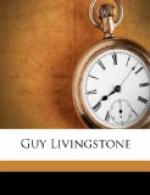“Philanthropic, for a change!” Mohun remarked, when his companion joined him. “Well, it’s not worse than many of your vagaries. We shall have you founding an asylum next, I suppose.”
In his heart the savage old cynic approved, but, for the life of him, he could not check the sneer.
Livingstone made no reply. It was a habit of his very often not to answer Ralph, and the latter did not mind it in the least. In a few moments they reached Guy’s apartments, where they found about a dozen men—French and English—awaiting their arrival to begin an unbridled lansquenet. It was a favorite rendezvous for this purpose. The thoroughbred gamblers preferred it to the brilliant entertainments of the Quartier Breda. They liked to court or fight Fortune by themselves, without being congratulated in success or compassionated in defeat by the fair Phrynes and Aspasias, whose sympathy was somewhat expansive, inasmuch as they always would borrow from the heap whenever any one won, repaying the loan in kind by smiles and caresses, which cost the happy recipient about fifteen Napoleons apiece. Here was an Eden from which Eves were excluded; and on the nights of the Mercurialia, the brightest Peri that ever wore camellias might have knocked at the gate disconsolately, but in vain.
While the tables were being prepared, Guy began to tell his late adventure. He spoke of it very lightly, but he thought, if he passed it over altogether, Mohun would probably betray him.
Immediately there was a great cry for a sight of the performances of the unknown genius.
Livingstone looked over the drawings himself carefully, and then passed them to the man who sat nearest him. “I have seen worse,” he said. “There is no signature, and I shall not give you the address. You are none of you just the patrons she would fancy. You don’t care much for high art.”
Among the guests was Horace Levinge, a pale, dark man, with a face that was decidedly handsome, in spite of its Jewish contour, and the excessive fullness of the scarlet, sensual lips. His grandfather, report said, had been a prize-fighting Israelite, and afterward a celebrated betting-man—equally eminent in either ring for an unscrupulous scoundrelism which made his fortune. His father had added to the family treasure and importance by cautious usury and adventurous stock-jobbing. Horace himself was a gentleman at large, with no other profession than the consistent pursuit of all kinds of debauchery. He was calculating even in his pleasures, and, they say, kept a regular ledger and daybook of the moneys disbursed in his vices.
When the drawings came to him, he glanced at them for a moment, and then threw them down with a little contemptuous laugh.
“I am sorry to spoil your romance, Livingstone, but I have a pretty good right to recognize the artist’s touch. You know her, some of you; it is Fanny Challoner.”




